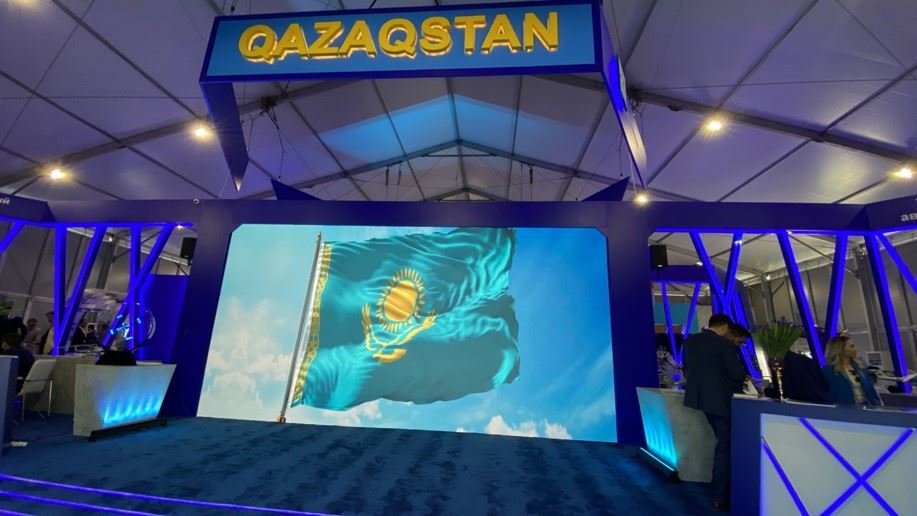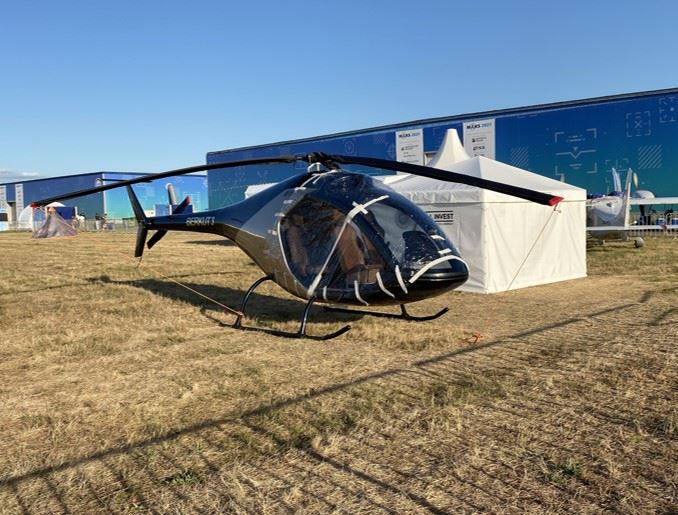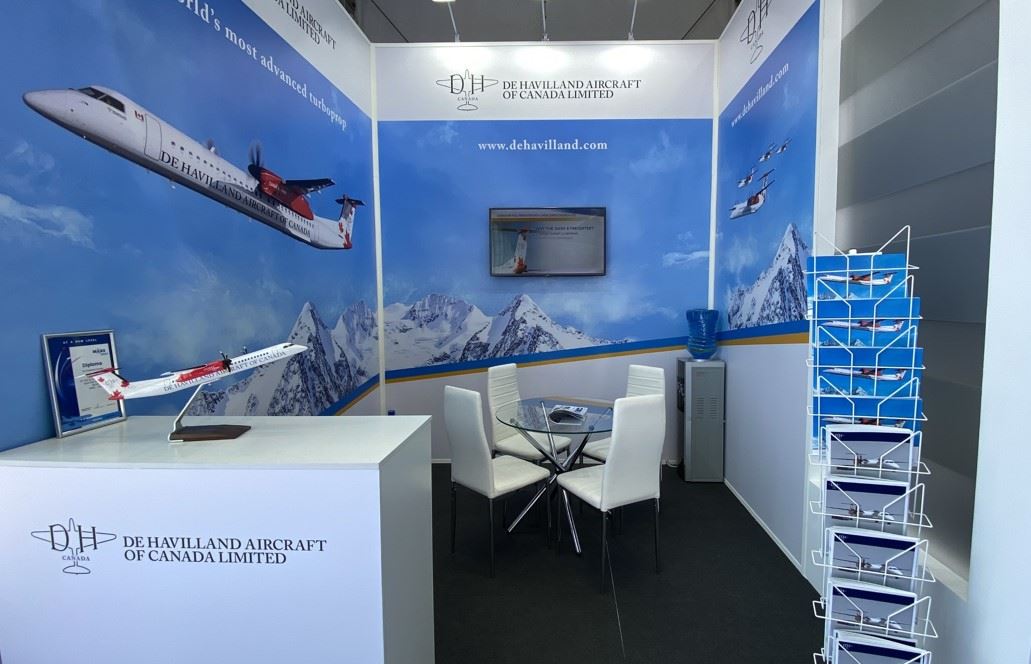




MAKS 2021, biennial Moscow event, has appeared to be the first major air show of the pandemic era. The venue held from the 20th to the 25th of July gave Russia’s aerospace industry an opportunity to display its domestically-developed wares.
Amid yet another COVID-19 wave, CERBA for the 6th time in a row brought together under one roof Canadian aerospace companies to take part in the tradeshow locally and remotely.
"Canadian business is committed to the aerospace sector in Russia in the areas of avionics, aircraft assembly, sales of business jets and space technology and other relevant fields. The fact that we continue to field a significant delegation at MAKS is testament to this commitment. Canada and Russia are natural partners in aerospace and CERBA will continue to promote cooperation to the greatest extent possible" says Nathan Hunt, CERBA Moscow Chairman.
De Havilland Aircraft of Canada and MDS Aero Support Corporation were the proud Canadian pioneers that exhibit at the XV INTERNATIONAL AVIATION AND SPACE SALON MAKS, others participated remotely and were yet listed in the catalogue.
 With three decades of history, MDS Aero Support Corporation is a long-standing Tier 1 supplier of turnkey test solutions for gas turbine engines and engine components in numerous projects that are run in Russia. Konstantin Ilchenko, Regional Director of Eastern Europe and Eurasia indicated at the exhibition that "MDA Aero Support is a regular exhibitor at MAKS. We especially enjoy face-to-face meetings, with our participation we show our devotion to the market and also boost lead opportunities".
With three decades of history, MDS Aero Support Corporation is a long-standing Tier 1 supplier of turnkey test solutions for gas turbine engines and engine components in numerous projects that are run in Russia. Konstantin Ilchenko, Regional Director of Eastern Europe and Eurasia indicated at the exhibition that "MDA Aero Support is a regular exhibitor at MAKS. We especially enjoy face-to-face meetings, with our participation we show our devotion to the market and also boost lead opportunities".
 De Havilland Canada showcased its Dash 8-400 and shared its aircraft fleet and service solutions. The most productive turboprop on the market, the Dash 8-400, made a good traction at the show. Known as the "network builder" due to its short take-off and landing capabilities and efficient regional operations, the Dash 8-400 comes equipped with more seats, more legroom, more cargo and offers more flights per day. "It is for the first time DHC promotes Dash 8-400 at MAKS and yet as you see it is crowded at our booth!" stated Anastasija Visnakova, Director of Sales EMEAR.
De Havilland Canada showcased its Dash 8-400 and shared its aircraft fleet and service solutions. The most productive turboprop on the market, the Dash 8-400, made a good traction at the show. Known as the "network builder" due to its short take-off and landing capabilities and efficient regional operations, the Dash 8-400 comes equipped with more seats, more legroom, more cargo and offers more flights per day. "It is for the first time DHC promotes Dash 8-400 at MAKS and yet as you see it is crowded at our booth!" stated Anastasija Visnakova, Director of Sales EMEAR.
"As a bilateral entity, CERBA has a responsibility to steer discussions that can benefit Canada Eurasia society and to use our voice and the voices of our members to spark conversations and inspire our network to take action. As such, within the MAKS 2021 tradeshow, together with CERBA Moscow Chapter we held multiple in-person and remote conversations with Russian and Kazakh entities," says Marina Belskikh, Regional director of CERBA in Ottawa and Montreal.
The interest to collaborate with Canada was expressed by the following organizations: - in Russia: Sverdlovsk-based Titanium Valley, Development Corporation of the Ulyanovsk Region", "Ulyanovsk" special economic zone, Ministry of Investment, Industry and Science of the Moscow Region, Moscow Innovation cluster and its technological companies, Center for International Cooperation of the Central Aerohydrodynamic Institute "TsAGI" in Russia, Far East Regional emergency agencies and Aircraft and helicopter manufactures and repair and overhaul services providers, a number of mining companies.
– in Kazakhstan: Kazakh Aviation Industry LLP and JSC "Republican center of space communication".
Here's a shortlist of subjects that the Association discussed with the federal and regional government agencies, development and research institutions, and businesses:
1. How Eurasia increases the transport accessibility and connectivity of territories, passenger and freight traffic, mobility of citizens
2. Development of regional aviation in Russia: challenges and solutions
3. Emergency and ambulance aviation in Eurasia
4. Sustainable growth of Eurasian aviation industry: criteria set and projections for the transformation
5. Russia’s aviation industry and its international competitiveness: the creation of the Russian Aviation Infrastructure System (RAIS) based on the value chain (VC); development of an integrated management structure for the aviation industry strategic planning system based on the RAIS; changing approaches to assessing the efficiency of the development of aviation industry from 2013 to 2030
6. Development of new transport hubs and upgrade of airport terminal (high tech) infrastructures
7. Readiness of Russian air fleets for upgrade and demand for new-generation fuel-efficient aircraft
8. Russia’s changing civil aviation regulations and their efficiency: progress on certification of new planes, import tax relief for the purchasing of western-built aircraft; introduction of electronic check-in and e-freight procedures, wet-leasing of an aircraft, etc.
9. The export potential of Russian aircraft and components producers
10. Leveraging of the financing of the aviation industry in Russia and Eurasian countries
11. Canadian best practices in improvement of transport infrastructure, unmanned vehicle regulation, growth of research capabilities, reducing the cost of servicing the flight hour, government measures to support the development of the industry, etc.
12. Personnel training programs in collaboration with Canadian educational entities
13. Joint research projects in the aerospace industry
CERBA projects to build on mentioned above join projects already within the upcoming Russia-Canada Business Council in November 2021. The Ministry of Transportation of Russia, Federal Air Transport Agency, Interstate Aviation Committee, Rosaviatsiya, Research institutions and other regional entities and businesses of Russia will be among contributors to the joint developments.
It is through building partnerships across sectors that CERBA creates social value and lays a path to meaningful relations and solutions. You are welcome to be a part of the developments. We will make sure to include each and everyone.